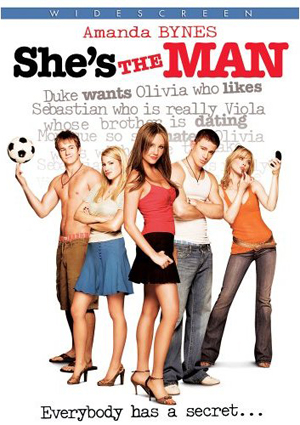
SHE’S THE MAN
US, 2005, 106 minutes, Colour.
Amanda Bynes, Channing Tatum, Laura Ramsay, Vinnie Jones, Robert Hoffmann, Alex Breckenbridge, Julie Hagerty, David Cross, Jonathan Sidowski Torti, James Snyder, James Kirk.
Directed by Andy Fickman.
Not the greatest teen movie that ever was, despite the basis in Shakespeare. The writers of She’s the Man include Karen Mc Cullah Lutz who adapted The Taming of the Shrew for the high school comedy Ten Things I Hate About You (as well as Legally Blonde and the Cinderella adaptation, Ella Enchanted). Ten Things worked much better than She’s the Man, which is an adaptation of Twelfth Night. The cast was better, the screenplay wittier – and it did not have the difficulty of disguise.
It is almost impossible to do disguise plausibly in cinema close-up. It works on stage because audiences accept the conventions and accept the fact that characters are not recognising each other. On screen, however, and in a ‘realistic’ setting, it defies belief. This is especially the case here because, despite her macho posturings and trying to be one of the boys, Amanda Bynes cannot really pass herself off as a boy. And, she does not look too much like her brother. And, Shakespeare’s Viola never had to share a college room with Duke Orsino, nor run the risk of exposure (in all senses) in the shower block, nor try to get on the Illyrian soccer team.
It is interesting and amusing to see how the writers try to get all the Twelfth Night elements into their screenplay with variations on names, situations and people falling in love as well as the disguises. But, as the main line from the play which is quoted here, some are born great, some achieve greatness and some have greatness thrust upon them, this does not apply here. This one is a modicum of enjoyment.
1.The appeal for the teenage audience? For girls? Boys? For adults?
2.The film based on Shakespeare, Twelfth Night? The parallels in the plot? Characters? The plot devices – how well do they transfer to the United States, to a youth culture and high school? The elimination of Shakespearian lines except for ‘Some are born great…’?
3.The American city, family homes, restaurants, schools, dorms, the playing fields, the shower block? The popular ingredients for audience identification? The musical score and songs?
4.The plausibility of the plot? In Shakespeare’s day? The fact that the female roles were played by male actors? The contrast with the film, the close-ups, audiences being able to see the differences in appearance? The female troupe pretending to be male?
5.Viola’s story: at home, her mother fussing, the absent father? Her mother being ladylike, with the other mothers, wanting Viola to be genteel? Her playing soccer, on the beach, goal-scoring? The Cornwall Academy – and the girls’ soccer team being disbanded? Her reaction? Her brother going to London, his interest in music? Her having to cover for him? Going to his new school, Illyria Prep? Viola’s decision to masquerade as Sebastian, to get into the soccer team? Her friend Paul, the makeover to make her look like a boy? Her posing as her brother at the school, her attempts to convince everyone that she is a boy, the coach, the principal? Sharing the room with Duke? Her exaggerated mannerisms to show that she was macho – and the humorous jokes about the Barbie theme on her phone, the tampons and her explanation that they are useful for nosebleeds (and Duke following that later)?
6.Viola in the dorm, sharing with Duke, he and his friends thinking he was strange? Olivia being attracted to him? Viola’s girlfriends in on the act? Making Duke jealous? The change of attitude? Duke and his friendship with Sebastian, the irony of the carnival and his meeting Viola as herself, the romance, at the sideshow? And his confiding in Sebastian? Olivia and her attraction towards Sebastian? The romantic complications?
7.The coach, Viola playing soccer, her bargain with Duke, her helping him with Olivia, his coaching her with soccer moves? The difficulties in the dorm – especially the shaving issue, showering, privacy?
8.The two weeks continuing, her mother wanting her to go to the debutantes’ ball, her trying to avoid everything feminine? The discussions with Olivia, Olivia’s attraction? Duke and his attraction to Olivia? The restaurant sequences? Duke and his girlfriend – and Sebastian’s girlfriend, the clashes in the restaurant? Malcolm as the Malvolio figure – sinister?
9.Sebastian’s return, Olivia kissing him, Duke seeing this? The consequences with the treatment of Sebastian? His going onto the soccer team, his being inept at the game? The reaction of the coach?
10.Viola, trying to get to the football, the hold-ups? The gradual discovery of the truth, her changing with Sebastian? Her appearing as a girl – and saving the match?
11.The explanation of the complications, Viola admitting the truth, Sebastian as himself? The later debutante’s ball – and Duke and Viola together? Sebastian and Olivia? And ‘all’s well that ends well’ as a combination of Shakespeare and high school comedy?)